Georgetown Law’s Prettyman Fellowship Marks 65 Years of Preparing Lawyers to Defend the Underrepresented
June 20, 2025
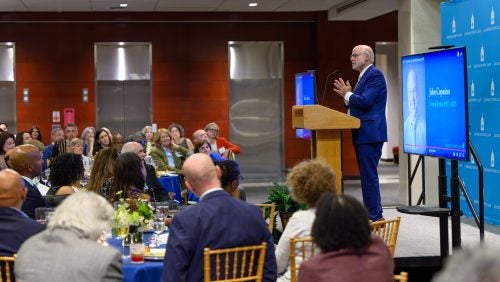
Professor John Copacino, Prettyman alumnus and longtime director of the Prettyman Program and the Criminal Justice Clinic, speaking at the anniversary dinner.
In 1960, Georgetown Law founded the E. Barrett Prettyman Program, which was – and still is – an innovative fellowship that trains recent law school graduates to represent indigent clients. On May 31, dozens of Prettyman alumni, along with other friends and supporters, gathered on campus to celebrate the program’s 65th anniversary and to congratulate one of its longtime leaders, Professor John Copacino, L’83, on his retirement.
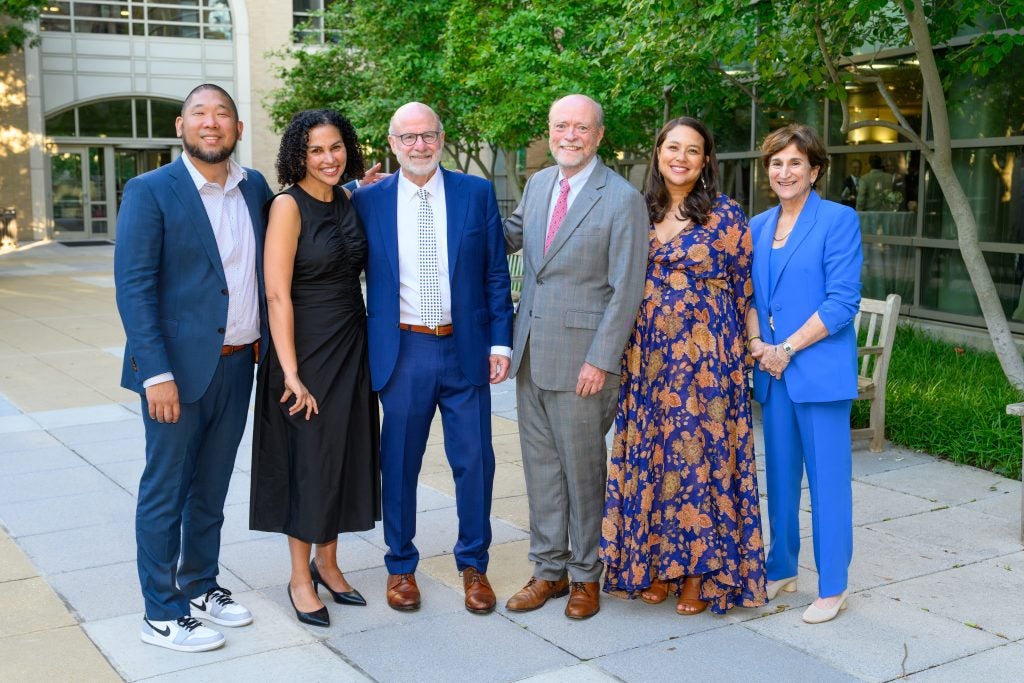
The current leadership team behind the Law Center’s criminal law clinics: (L-R) Visiting Professor Pierce Suen, Professor Vida Johnson, Professor John Copacino, Dean William M. Treanor, Visiting Professor Amanda Rogers, Professor Abbe Smith. Johnson, Copacino and Rogers are all past Prettyman fellows.

Among the Prettyman alumni in attendance were the program’s only parent-child pair: Daniel Engelberg, L’07, and Stephen Engelberg, L’68.
The festive event took on the atmosphere of a family reunion, as returning fellows embraced former colleagues, students and teachers, reminisced about old cases and enjoyed being among kindred spirits. “All the best people in the world are here!’ said Andrew Guthrie Ferguson, L’03, who worked as a public defender in Washington, D.C. after his Prettyman fellowship and has just joined the faculty at George Washington University Law School.
Professor Abbe Smith, co-director of the Prettyman Program and director of the Criminal Defense and Prisoner Advocacy Clinic since 1996, served as co-master of ceremonies for the evening with Professor Vida Johnson – and found herself unable to avoid superlatives as she introduced each speaker. At one point, she welcomed her “favorite judge,” Associate Judge of the Superior Court of the District of Columbia and Adjunct Professor Todd Edelman, L’83, to the podium – then quickly pivoted to mention the other “favorite” judges in the room. “We love everybody. Everybody in this program, I’m still madly in love with,” she explained.
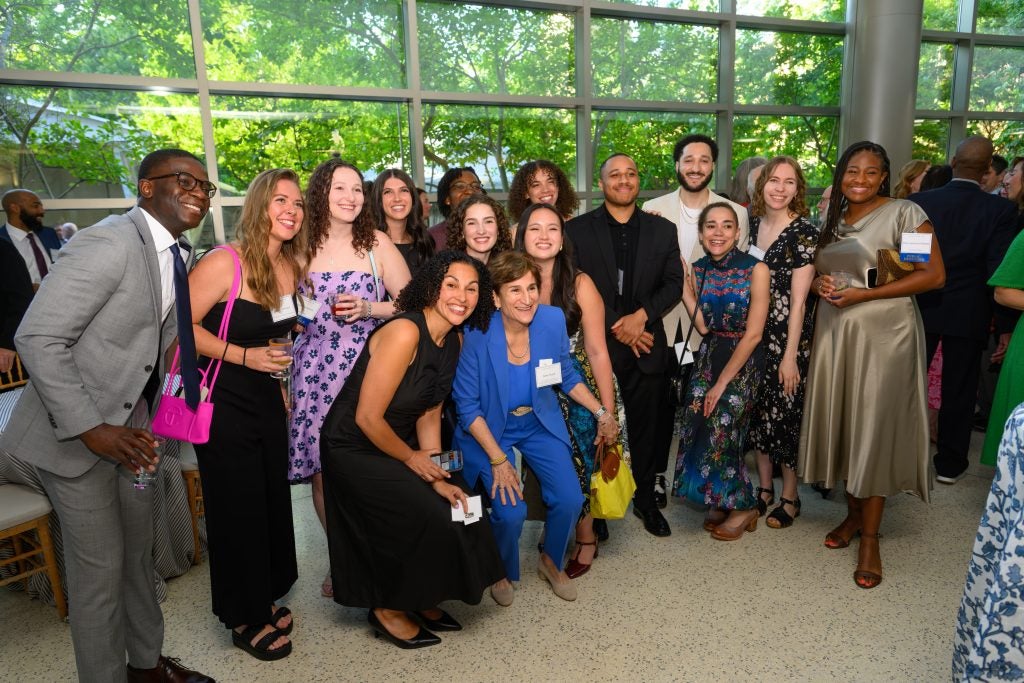
Recent graduates of the Prettyman Program reunited for a photo with Professors Johnson and Smith
A MIGHTY LEGACY
Fellows in the E. Barrett Prettyman Program, named for a prominent Washington, D.C. judge who was a Law Center alumnus (LL.B. 1915) and faculty member, earn LL.M. degrees in legal advocacy, represent clients in criminal cases and help supervise J.D. student attorneys in three of the school’s clinics: the Criminal Defense & Prisoner Advocacy Clinic, Criminal Justice Clinic and Juvenile Justice Clinic. It has become a prestigious postgraduate fellowship, each year admitting three recent graduates out of nearly 100 applicants from leading law schools for an intensive experience that launches most of them into careers in public defense, legal education, pro bono advocacy and other areas of public interest law.
The collective effect the 299 Prettyman fellows and the students they have trained have had on the nation’s criminal judicial systems over the past six decades is incalculable. More than half became public defenders (at least for a time), 13 currently teach in law school clinics and 10 went on to serve as judges.
Garrett L. Wong, L’82, a judge of the Superior Court of San Francisco County, came from the West Coast for the event. Reflecting on how his Prettyman experience had shaped his career over the past four decades, he said, “It’s meant everything.” He recalled how the program’s then-director, Professor William Greenhalgh, had impressed on him the importance of meticulous preparation before appearing in court, and how his work with young clients in the Juvenile Justice Clinic had taught him about the need to be flexible and preserve options for rehabilitation when making sentencing decisions.
Georgetown Law Dean William M. Treanor testified to having learned first-hand about the Prettyman fellows’ legal skills when he was a special U.S. Attorney in the 1980s and lost a case in court to a Prettyman fellow. “It was a great experience in encouraging my humility,” said Treanor. “[But] it was a loss that actually turned out to be a win in terms of my career, because I learned so much about the power of this program,” he continued. Moments later, Treanor was delighted when Professor Vida Johnson, a Prettyman alumna who returned as co-director of both the Criminal Justice Clinic and the Prettyman program, presented him with a framed certificate naming him an honorary Prettyman fellow, in thanks for his support of the program.
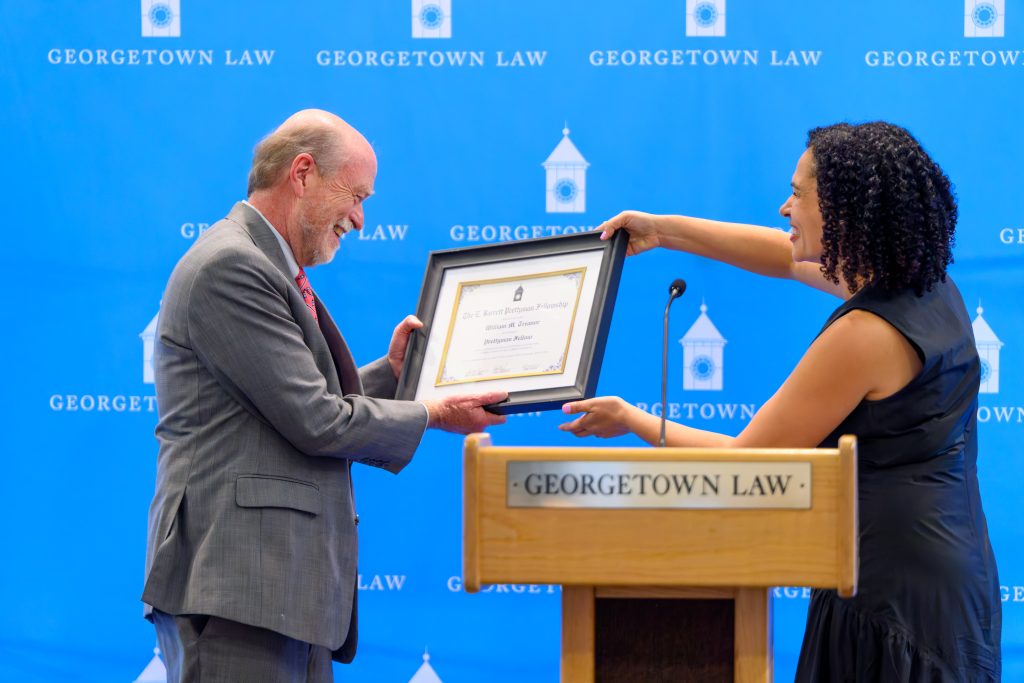
Treanor receiving his honorary Prettyman fellowship from Johnson
HONORING JOHN COPACINO
Of the many superlatives and expressions of affection spoken during the dinner, the lion’s share went to Copacino, a Prettyman alumnus who recently retired from the Law Center after serving since 1987 as director of the Criminal Justice Clinic and co-director of the Prettyman Program.
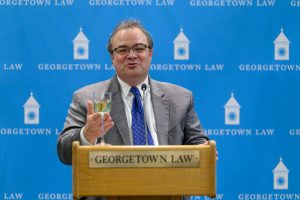
Edelman taking the podium to deliver a toast to Copacino
Delivering the evening’s official toast to Copacino, Edelman, who was a public defender earlier in his career before being appointed as a judge, said, “Everyone here could talk for a long time about what John has done for us in our career and the impact he’s had on all of us… He’s had truly generational impact in the Georgetown clinics, in Superior Court – and really in the national criminal defense community… Over the years, when I’ve been asked to speak about what makes a great defense lawyer and what a great lawyer does, I’ve really just been talking about John the whole time.”
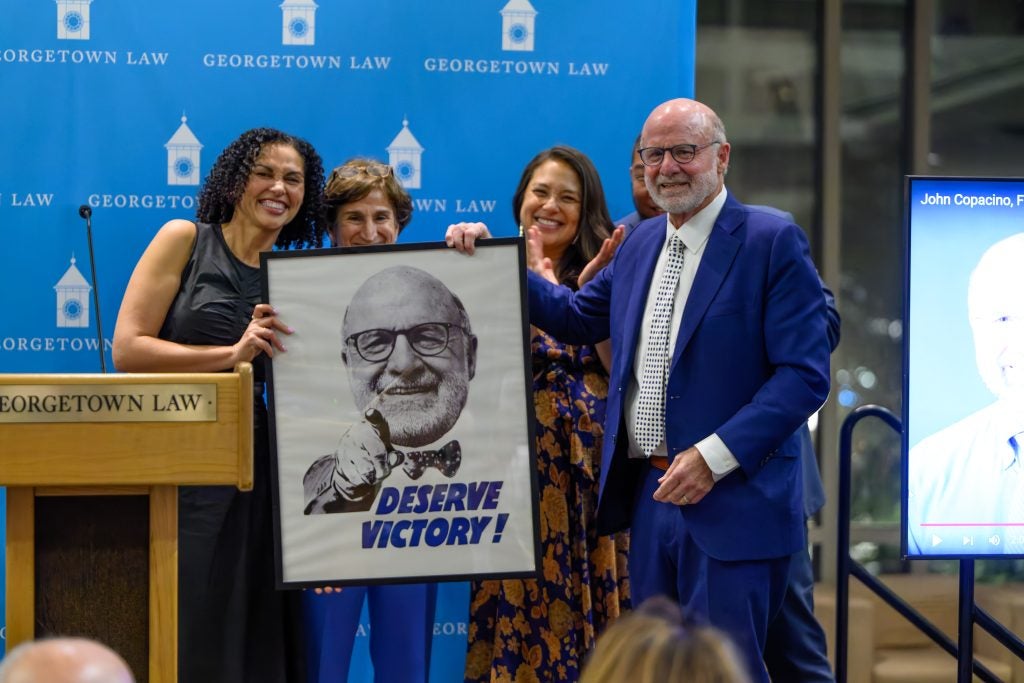
Copacino’s colleagues presented him with a customized version of a historic World War II-era poster featuring Prime Minister Winston Churchill that Copacino had often given to past Prettyman fellows as a morale booster.
But the evening’s last words came from Copacino himself, who spoke of the difficult work all the past fellows in the room had taken on and the friendships they had formed in the process. “Every single day on this job has been a joy in one way or another. It’s been an absolute pleasure. I don’t think many people who retire after 38 years get to say that, but I can say that without hesitation, without reservation… [This job] has brought all of you people into my life, people who have just worked so hard at this. People who created a community, people who did such great stuff with their clients, people who worked so hard and won a lot – and lost a lot. Because you lose a lot in this business… We try and create a community that makes that OK, that creates an intimacy, that creates a bond, that creates a relationship that lasts 38 and a half years – and lasts forever. I’m forever grateful for what you gave to me: for the opportunity to have this job, for the opportunity to work with you, for what we did for our clients and for what you are doing out in the world.”